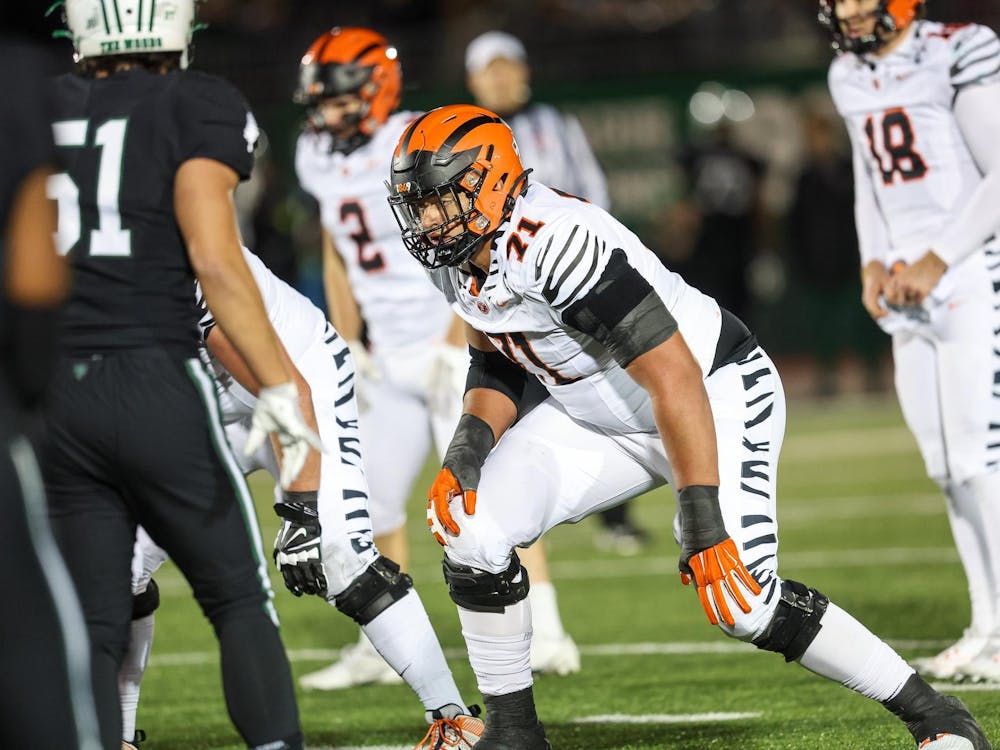In the sixth minute of a game between the men’s soccer team and Lafayette last season, junior defender Chris Benedict received a throw-in from senior defender Mark Linnville while open behind the box. With no defender anywhere close to him, he touched the ball twice and then shot from 20 yards out toward the left side of the goal.
The ball bent past the diving Lafayette goalkeeper into the upper corner. It was one of the most impressive goals of Benedict’s career and one of the most aesthetically pleasing the Tigers scored all season. The goal was witnessed live by 553 people at Roberts Stadium, but Benedict’s gem reached a much wider audience: It happened to occur during the one men’s soccer game a year broadcast nationally on ESPNU.
“We scored arguably the greatest goal ever with Chris Benedict’s goal,” head coach Jim Barlow ’91. “From that standpoint, it’s been great for people to see some of the things our guys can do.”
Tonight, Princeton’s game against No. 24 Creighton will be broadcast live on the network. When the Department of Athletics’ relationship with ESPN began in 2005, the network mainly carried football, men’s basketball and men’s lacrosse games. But in recent years, the men’s soccer and men’s water polo teams have had their games broadcast nationally as well.
While the Department of Athletics would like to see ESPN carry a more diverse array of sports, it has benefited in terms of recruiting and connecting with its fan base nationwide.
As Director of Athletic Communications Jerry Price tells it, ESPN first contacted Princeton while it was looking for programming shortly after ESPNU launched in 2005. FANSonly, the athletic department’s web platform at the time, had a number of connections with ESPN. Princeton gave ESPN rights to what Price described as its most marketable event — the Penn-Princeton men’s basketball game at Jadwin Gymnasium — and the two sides formalized the rest of the contract from there.
They struck a deal in which the network carries a minimum of seven Princeton home games across multiple sports that are broadcast on ESPN platforms throughout the year. Games can be broadcast on any ESPN network, but so far they have all been aired on ESPNU. Others have been streamed online through ESPN3, though these do not count toward the total of seven games that ESPN is required to carry. So far this season, ESPNU has already shown the men's water polo game against University of California, Berkeley, and a football game against Georgetown.
Though Price said a clause in the contract prohibits him from publicly disclosing the details of the deal, it is widely known that neither Princeton nor ESPN receives any compensation through the deal.
Nevertheless, Price pointed out that ESPNU covers the production costs of the games it broadcasts, which can exceed $50,000.
Besides finances, the deal gives Princeton — currently the only Ivy League school with a television contract with ESPN — the opportunity to showcase its teams and facilities on a national scale. The men’s soccer team appeared in its first ESPNU game just a year after Roberts Stadium opened in 2008, giving the team a chance to impress potential recruits with its new facility. Of course, when a team plays well on national television, it also leaves a positive impression on potential recruits.
Price pointed out that tonight’s soccer showdown against Creighton, a semifinalist in last year’s NCAA Tournament, is as much about showing off the facility as it is about providing an entertaining game.
“Hopefully recruits around the country see that and say, ‘That looks like a great place to play,’ ” Price said.

The deal also allows alumni and players’ family members across the country to watch games. When ESPNU carried the men’s water polo team’s victory over Santa Clara in 2010, it gave the players’ families — over half of whom live in California — a chance to watch their children play.
“All my friends and family were able to watch back home,” said senior attack Tim Wenzlau, who is from Palo Alto, Calif. “It definitely elevates the intensity of play because you know everyone’s watching.”
Princeton has had to make some tradeoffs to allow for the deal with ESPN. Particularly with football, Princeton has had to reschedule games from Saturdays — when college football games are traditionally played — to Thursdays and Fridays to accommodate ESPN, which carries more nationally prominent games on Saturdays. Price said this impacts attendance figures.
Furthermore, the athletics department is not allowed to stream games carried by ESPN on its subscription-based online streaming service, GoPrincetonTigers.tv.
“That’s a little bit of revenue that we’re going to lose, but it’s worth it to be part of ESPN and to be part of their ability to promote and what they bring to the production,” Price said.
In recent years, Price has been trying to persuade ESPN to carry more women’s sports — particularly women’s basketball and women’s water polo — but he said the network has been reluctant.
Though he declined to say how many years are left on the contract, Price said he sees no reason why the partnership won’t continue in future years.







